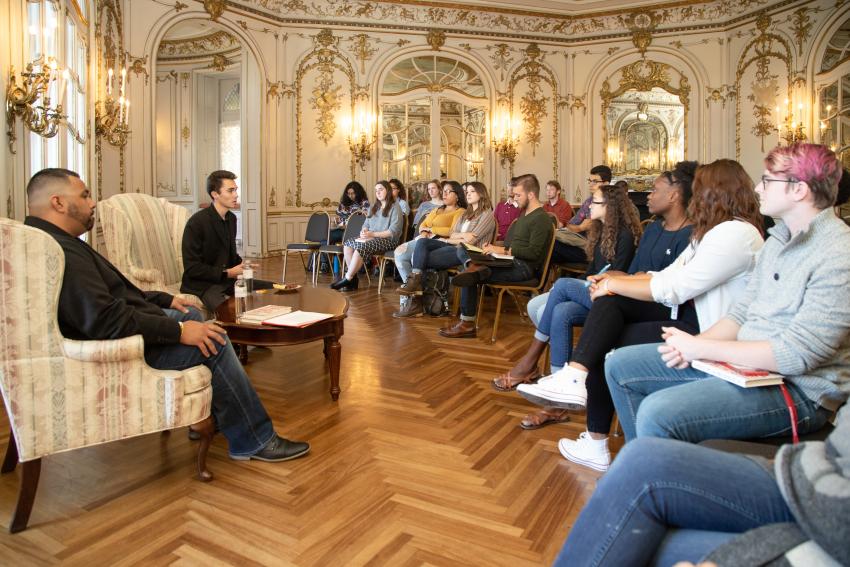At Common Read Event, David Hogg Urges Civic Engagement, Activism

David Hogg speaks to first-year students during an afternoon discussion session.
At this year’s Common Read on Oct. 14, 19-year-old David Hogg, March for Our Lives co-founder, gun control advocate, and survivor of last year’s mass shooting at Marjory Stoneman Douglas High School in Parkland, Fla., urged students to be civically engaged this election season and vote for politicians who supported gun reform.
Nearly 40,000 people die in the United States due to gun violence each year, according to a 2017 Center for Disease Control (CDC) study. Throughout the day, Hogg spoke on some of the factors that contribute to gun violence and methods on how to address it.
“Human beings are not naturally violent, it’s only when we have things happen to us that cause us to become violent,” said Hogg. “I think there’s a problem with the imagery of guns around the United States and how we’re constantly telling our young men that it’s not okay to be sad. Our young men in the United States feel more comfortable picking up a gun to end their problems than picking up a book and learning how to debate them.”
The March for Our Lives movement, a student-led demonstration in support of legislation to prevent gun violence in the United States, has proposed a six-point Peace Plan for a Safer America, a proposal that seeks to cut the number of victims to gun violence by half in 10 years through interdepartmental coordination of government agencies, universal background checks for gun purchases, and a ban on assault-style weapons and high-capacity magazines. The movement also advocates for more readily available mental health resources to address the gun violence “disease,” Hogg said.
“Thrust into the world of activism by the largest school shooting in American history, David has become one of the most compelling voices of his generation,” said Dr. Ajay Nair, president of Arcadia and facilitator for the event. “He has challenged us to elect morally just leaders. He has challenged us to be a reflection of the world we want to live in—a world without gun violence.”
First-year students read Glimmer of Hope: How Tragedy Sparked a Movement written by the founders of March for Our Lives, which lays out how to start a movement. At the Common Read event, Hogg discussed how young adults could impact politics through engaging in civic activities like voting in the primary and general elections and working for a political campaign.
“We chose the book ‘Glimmer of Hope’ this year because it highlights the voices of young people talking about one of the most important issues our nation faces right now,” said Dr. Rachel Collins, adjunct professor of English and director of the First-Year Experience. “That’s why we’re thrilled to have David here tonight.”
Hogg met with a select group of first-year students prior to the main event to discuss the book and his experiences, as well as to motivate them to register to vote.
“It’s interesting to hear from someone who is around our age,” said biology major Michelle Frank ’22, from Spring City, Pa. “It was an incredibly raw book; you could tell the writers didn’t hold back. They had clarity for how to achieve their goal, and it was amazing the call-to-action for young people to get involved.”
During the book signing, students spoke with local March for Our Lives chapter representatives, as well as Arcadia University’s branch of Amnesty International. Through the Office of Social Impact and Innovation (SI2), nearly two dozen students began the process of registering to vote with or without a party affiliation. SI2 has also started a voter registration office in Blankley House, so students can find support throughout the year on campus.
“We should all be pissed off that we are registered to go to war when we turn 18, but we’re not automatically registered to vote,” Hogg said during the event. “The movement is just beginning. The only way we save ourselves and our democracy as the United States of America is by going out there and working together as Americans for a better and brighter future, electing politicians—no matter the letter next to their name—that have the priority of protecting our children, not guns.”


